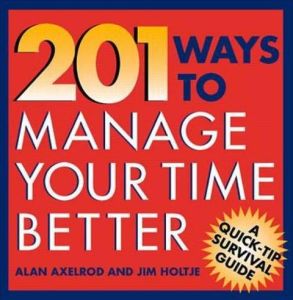Join getAbstract to access the summary!

Join getAbstract to access the summary!
Alan Axelrod and Jim Holtje
201 Ways to Manage Your Time Better
A Quick-Tip Survival Guide
McGraw-Hill, 1997
What's inside?
If your find that “time flies” describes your entire work day, every day, grab those flying minutes and use them more efficiently. This snappy guide offers useful suggestions and even tells you how to hold meetings without MEGO (My Eyes Glaze Over).
Recommendation
This cheerful and snappy little book offers a host of helpful suggestions for using your time and talents. You will appreciate Alan Axelrod and Jim Holtje’s humor, practicality, and common sense. Their advice - which applies to people at all organizational levels - ranges from planning timely and productive meetings to using the telephone wisely. They also discuss voice-mail etiquette, the best way to start your day, travel tips, and how to improve your reading speed and skills. You will benefit from the suggestions for managing your personal time, too. Supervisors can use this book to help their employees manage time more skillfully. The book is short and to the point, and happily devoid of verbosity. getAbstract recommends it as a text that will help you save time, calm frustrations, increase efficiency, multiply successes, impress others, and please yourself.
Summary
About the Authors
Alan Axelrod is the producer of numerous business and communications books. Jim Holtje is the director of International Client Services, a corporate communications and public relations management-consulting firm in Washington, D.C.






















Comment on this summary